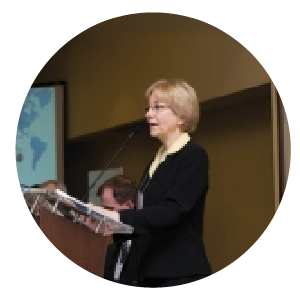
About The Global Institute of Logistics
The Global Institute of Logistics was established in 2003 in response to the global logistics industry’s call for “joined up thinking” amongst the stakeholders in the global supply chain. The Institute provides practitioners with an international forum for peer group networking, discussion and learning on latest developments in global maritime logistics strategy.
GIL's objective is to provide the global maritime logistics industry with a forum through which global shippers, 3PLs, carriers, port authorities and terminal operators can collaborate closely to share their knowledge so as to improve supply chain efficiency. Stakeholders are encouraged to co-operate closely and consistently in leveraging best industry practices to add real value to the supply chain management process.
GIL has two distinct parts acting as both a Think Tank and Membership organization. As a Think Tank GIL acts as a bridge between the academic world and the world of business, educating the global supply chain community on the latest in academic thinking while at
the same time balancing and correcting the various hypotheses emanating from the academic community with the real experience of early adopters. Balancing theory and practice, the Institute follows the conjecture emanating from the leading academics and institutions with a view to understanding the future of the global logistics industry.
The work of the Think Tank is concerned with resolving the challenges that have beset the global maritime logistics industry as a consequence of a long tradition of managing single transport modes and modal systems and setting targets on the efficiency of stand-alone logistics operations.This Modus Operandi has set in place a culture that 'disintegrates' rather than integrates our freight and supply chain systems, this culture has become all the more destructive with the lengthening of the supply chain as a result of global sourcing and selling.
Globalization is demanding a new ways of thinking and new ways of dealing with the challenges of fully integrating business processes along extended and complex global maritime supply chain systems. Nowhere is the need more evident than in the container logistics supply chain,this is the area in which the Institute has been particularly active in researching and our work continually points us to the potential of the Port Authority to radically intervene in the process as an agent of change.
As a Membership Organization for international port communities, the Institute is focused on identifying best practice and building international standards of excellence through engagement with Port Authorities, logistics providers, shipping companies and other maritime supply chain organizations. This, in turn, creates a platform through which knowledge is shared, best practice is adopted and trade developed. Indeed research findings emanating from our Think Tank conclude that Port Authority’s are in the ideal position to influence the quality of logistics in its sphere of influence and that in essence it is possible to “improve global maritime logistics one port at a time”.
Since its inception in 2003 GIL has established local Chapters in the United States, China and in Europe.
Message From Institute Chairman
His specific subject matter expertise is the maritime container logistics supply chain. His work includes the development of the Container Terminal Quality System and the establishment of chainPORT the alliance of the world’s leading container port authorities. He is the moderator of the OECD/ITF Global Maritime Logistics Forum.
Kieran began his career in the early 1980s working as an industrial engineer in the European multinational manufacturing sector. By the late 1980s, he was working as a publisher in the trade, technical and scientific media where he was directly responsible for journals and magazines, which documented the rise of foreign direct investment (FDI). In 1989 he was appointed Deputy Publisher to the Paris-based Eurexpansion Group with responsibility for Ireland’s ‘Sunday Business Post’. In 1995 he was appointed Executive Director of the European Institute of Transport.

Testimonials

Certification according to the Global Institute of Logistics CTQI standard shows that Container Terminal Altenwerder (CTA) procedures, management organisation, and performance all meet the requirements. At the same time, the certification stimulates our team to further improve the performance for and with our customers. Thanks to the exchange of knowledge and experience with other international terminal operators during the Institutes benchmarking process, new impulses for our own development also arose. The additional operating effort is manageable since reliable and fast operating and information processes are of great importance to CTA anyway.
Mr. Heinrich Goller
Managing Director
Hamburger Hafen & Logistik

I commend the Global Institute of Logistics for its work in promoting collaboration as the key to delivering global logistics solutions. We have moved from an Industrial Age enterprise to a 21st century business. This period of transition from one economic order to another sees the ending of an era when businesses were inwardly focused concentrating on a buyer seller model to a truly outwardly focused model concentrating on collaboration as the key means to add value and impact the bottom line. Collaboration is destined to be a primary proficiency for the next millennium and I welcome the Institute's work in establishing this new order.
Mr. Jost Hellmann
President
Hellmann Worldwide Logistics

The Port of Hamburg has enjoyed a long and constructive relationship with the Global Institute of Logistics. The city and the Institute have had many successful collaborations not least being the development of the Container Terminal Quality Indicator (CTQI) the container industry’s only Quality system and international standard which has been implemented by HHLA at Container Terminal Altenwerder and Container Terminal Tollerort and certified by DNVGL.
Senator Frank Horch
Ministry Of Economy Hamburg

I am excited about being part of an organization that is solely focused on improving our industry using education, knowledge, data analysis, benchmarking and standards as the primary tools, the Institute's approach is to look at every aspect of the issue to bring about the right kind of change that will benefit all of the components in the logistics chain and ultimately result in more business.
Mr. Jerry Bridges
President
Virginia Port Authority

It is not without reason that the Institute enjoys a fine reputation in the eyes of the world. It stands for inventive talent, hard work, and the ability to organise. These are but a few of the attributes needed, to master the challenges of introducing a Global Container Terminal Quality System. It was a great pleasure to work as a member of this team.
Mr. Marcus Leaver
Ocean Freight Director
DB Schenker

I was honoured in my time as President of China Merchants to serve as Chairman of the Global Institute of Logistics. The Institute has done an excellent job in bringing logistics stakeholders from across the world together.
Dr. Fu Yuning
Chairman
China Resource Holdings

I would like to encourage people to work with the Global Institute of Logistics if they want to make a difference in the industry. GIL doesn’t promote logos they only promote learning and that is highly commendable.
Mr. Gene Tyndall
VP
Tompkins International

I support the Global Institute of Logistics. I agree with its contention, that we, as the first generation of global logisticians, have the responsibility of coming together to build the tools needed to support globalization.
Mr. Joachim Coens
President
Zeebrugge Port Authority

The Global Institute of Logistics just blew us away. They had so much information, When resources are limited, let’s not reinvent things. We can find a better way with the best of what others already know.
Ms. Ruth Sol
President
Westac Canada
Our Work
Thought Leader
A thought leader is an individual or firm that is recognized by GIL as an authority in a specialized field and whose expertise is sought and often rewarded. Here your organization can speak directly to readers in the words of your Chief Executive. The adress is in the first person and welcomes readers to explore further the people, services and territories that represent your company.
Best In Class
The Best in Class accreditation recognizes organizations that demonstrate a commitment to best practice in logistics execution and take a collaborative approach to their work. Accredited companies are "first movers" or "thought leaders" and demonstrate an exceptional level of regard for the role and function of collaboration in the development of their business and demonstrate a significant level of operational and strategic integration.
G50
G50 is an important addition to the Institute's benchmarking work. Global container terminal operators and port authorities already convene within the Institute and have contributed significantly to the development of their respective sectors. The G50 will commit to the adoption of best practice and by working together will accelerate the adoption of uniform standards and practices particularly in the area of IT.
